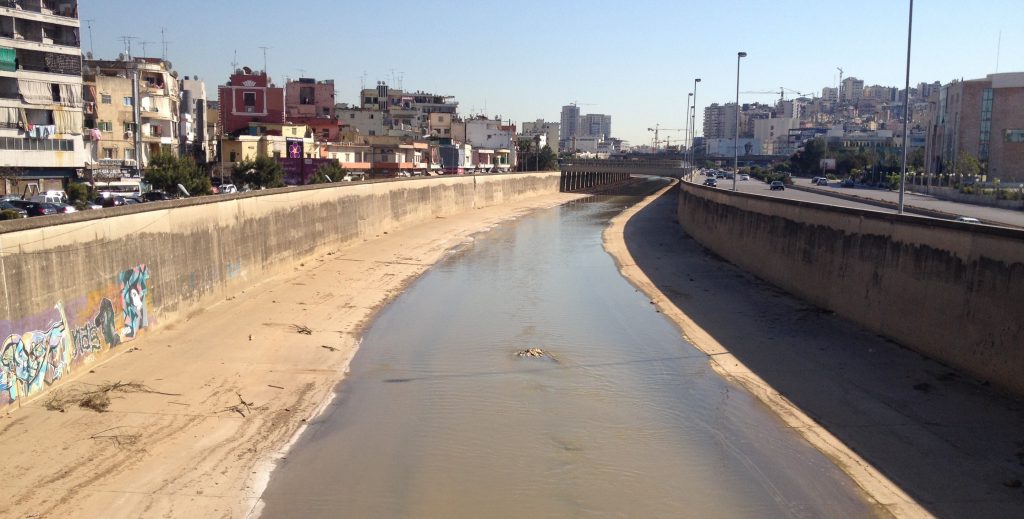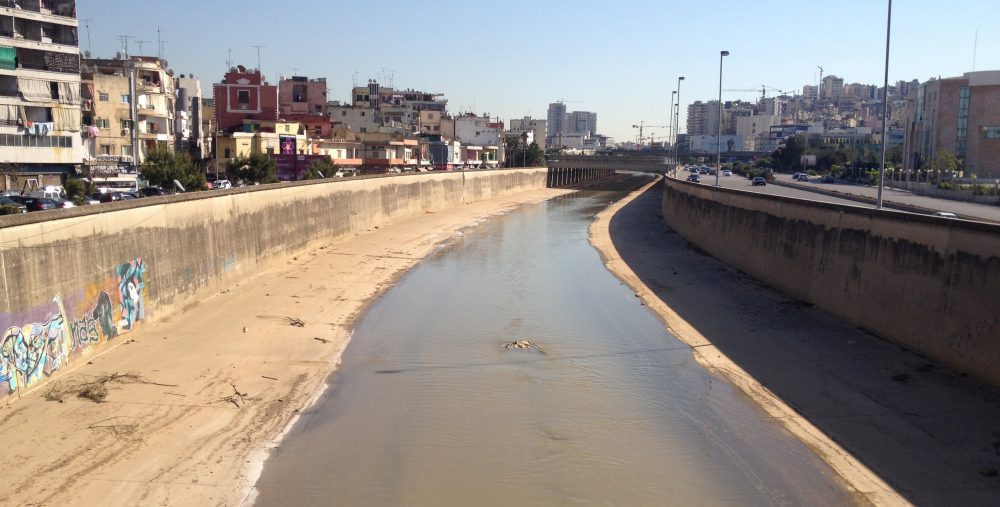
The Beirut River slows to a trickle in summer [Photo: Sam Bollier/JMEPP]
Water is the cornerstone of human life. But what happens when the demand for water increases faster than the available supply of freshwater resources?
In a 2015 report, the World Resources Institute ranked the “water stress” of 167 countries, and projected that 33 of them would experience extremely high water stress by 2040. These 33 countries include 14 states in the Middle East, including every country in the Levant region: Lebanon, Syria, Jordan, Israel, and Palestine.
For many households in the Levant, water has become a precious commodity, with water flow limited by low-pressure showerheads and heating limited to kerosene-powered space heaters, instead of systems that use water as a heating source.
Given these dire prospects, how could countries in the Levant address water scarcity – and how might access to water affect political dynamics in the region? JMEPP’s Numan Aksoy spoke with Nadim Farajalla, the director of the Climate Change and Environment in the Arab World program at the American University of Beirut.
Journal of Middle Eastern Politics and Policy: In the foreseeable future, do you believe water resources will be a critical political issue between nations in the region?
Nadim Farajalla: I believe water resources management is all about politics – it is the art of the possible. Water demand is rising in the area due to population growth, growing economies, and a changing climate. Governments need to establish national programs on birth control to reduce population growth. In addition, they are required to work to reduce causes of migration, immigration, and refugee “generation.”
All of these need political actions that are national, regional, and international. Availability of technologies and funding to treat wastewater, desalinate brackish [water] and seawater, is arrived at through diplomacy, negotiations – again, politics. Within countries, transfer of water from one region to another may require major political agreement between communities, parties, et cetera.
JMEPP: Do you think that water scarcity in rural Syria led farmers to move to urban areas, magnifying the protests that sparked the current civil war? Will water insecurity become a catalyst for future Arab Spring-like protests in the region?
NF: The role of water is minimal in the Syrian crisis. Turkey, Jordan, and other countries have had similar droughts but have not come to experience the violence Syria has. Having said that, water security can and might lead to confrontations – but history has shown that there are many more cases of cooperation over water scarcity than conflict.
JMEPP: The U.S. National Intelligence Council has published a report stating that Middle Eastern countries are at greater risk of instability and state failure, due in part to water problems. If the report’s findings prove to be accurate, how will this instability affect international relations in the region – for example, between Egypt and Israel or Jordan and Lebanon, which struggle to meet domestic demands and are further weighed down by millions of refugees?
NF: There are many examples of shared water resources that are under threat in the region, and until now the military power of the riparian [states] has dominated relations rather than the UN’s Convention on the Law of the Non-Navigational Uses of International Watercourses. …
In the case of … [Egypt], Israel is encouraging, working with, and supporting the Ethiopians to build the Renaissance Dam, which is causing great anxiety in Egypt because [Egypt] relies extremely heavily on the Nile for water, and any disruption to that supply is detrimental to the country. Negotiations with the Ethiopians on the issue are underway, and this is a shift away from the threats and counter-threats that were declared when tensions had risen between the two nations … This is a typical example where popular demand for action might force governments to act – it may be in a negative way – because people in the street perceive the Israelis and Ethiopians as personally acting to deny them water that they have enjoyed access to for millennia.
Tensions between Israel and Jordan over the Jordan River have subsided after the two countries’ peace agreement, mainly through the Red-Dead canal, which is supposed to provide sufficient desalinated water to the Jordanians to offset some of the Jordanian water Israel had taken, and the increasing demand the country is facing. Noteworthy is the fact that Israel has increased its diversity of water sources and thus increased its water security. Israel now has water from the Red-Dead canal, the Jordan [River], groundwater from the occupied West Bank and the Golan, through the reuse of treated sewage effluent and desalination of seawater.
The same cannot be said about the relations between Lebanon and Israel over the Wazzani-Hasbani complex [the headwaters of the Jordan River]. No progress has been made there, and the “might-is-right” rule still applies.
So the answer to your question is that relations between countries will be affected by water shortages and droughts. Often times in the region, however, the reverse is true: relations between countries have led to increased water shortages. For example, the influx of Syrian refugees into Lebanon has nearly doubled the demand for water, [thereby] stressing an already fragile resource. The bombing of water infrastructure by Israel in 2006 has led to water shortages in Lebanon – not to mention the displacement of nearly a million people to areas that were already suffering from shortages.
JMEPP: In 2014, Jordan signed an agreement with the Saudi Arabian Corporation for Oil Shale (SACOS) to meet domestic demand for oil through fracking. Does fulfilling the domestic demand for energy outweigh the domestic demand for water, if fracking pollutes water resources?
NF: In a country like Jordan, energy may be a source of water. Available freshwater is very limited in Jordan, and groundwater in many places is brackish. So if oil or gas can be accessed through fracking, then they can be used to desalinate water (brackish or seawater), or treat wastewater for reuse.
JMEPP: What are some methods governments can adopt to help mitigate problems engendered by water scarcity? Are desalination plants, such as those in Israel, a solution?
NF: Water management in the region must focus on both supply and demand management. Before we get into the expensive option of desalination, we need to reduce waste, and then move on to harvesting whatever rainwater we get. Afterwards we can move to reusing wastewater, and then onto desalination. Some countries have no option but to desalinate; however, they should be reducing demand – check the per capita demand or consumption in the UAE [United Arab Emirates], KSA [Saudi Arabia], Qatar; versus that of the US, Australia, or Canada.
JMEPP: If you could speak one-on-one with heads of state of each Middle Eastern country, is there a single sentence or two that you would like to tell them about water security?
NF: For the oil-producing countries, I will tell them that their oil production, in the very near future, will not be sufficient to desalinate water to meet their people’s demand. For the Levant leaders, I would urge them to realize that their people will go thirsty if they do not combine new technologies and management methods (demand and supply) with those that our ancestors used – rainwater harvesting, and planting and eating in-season crops.
